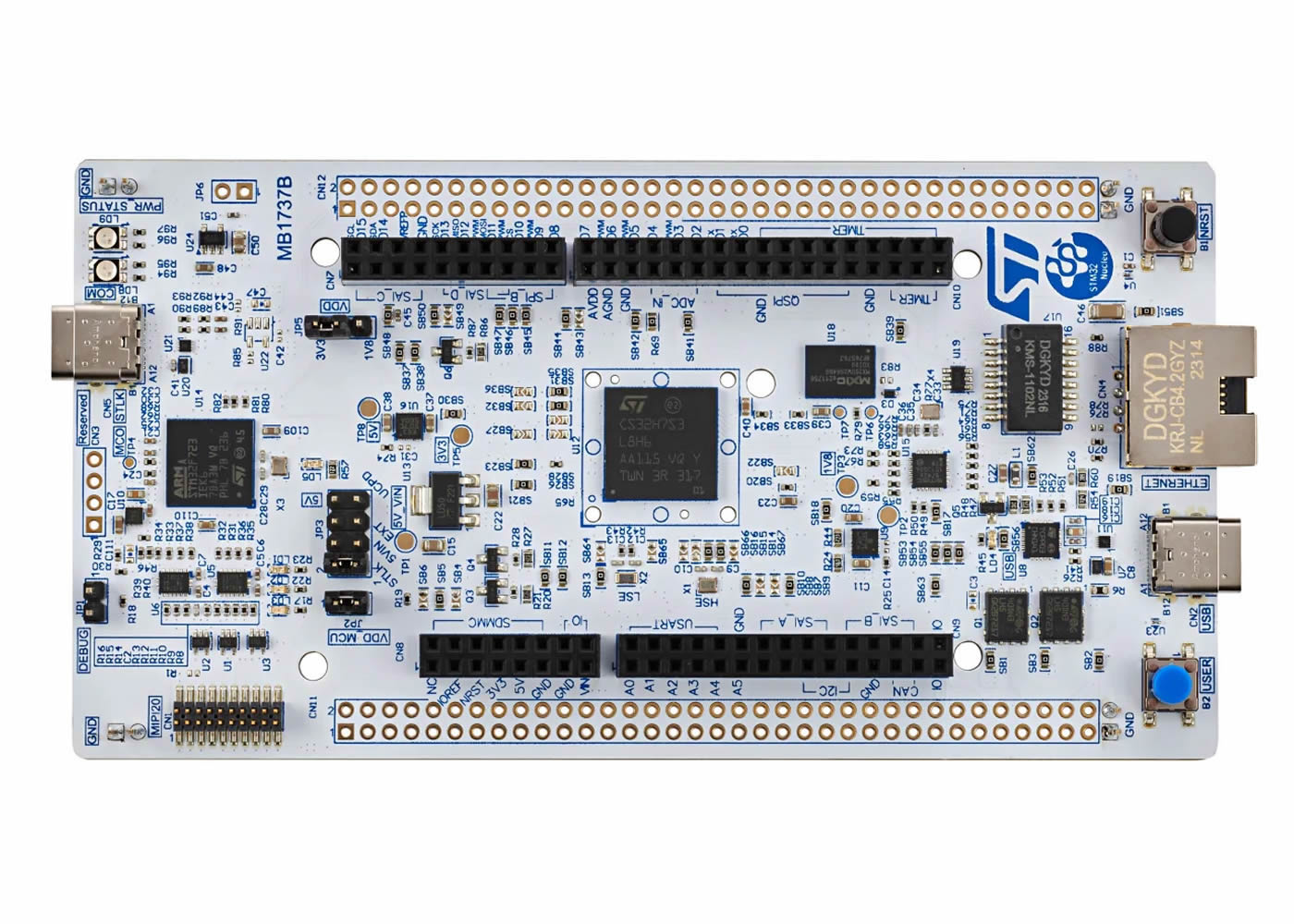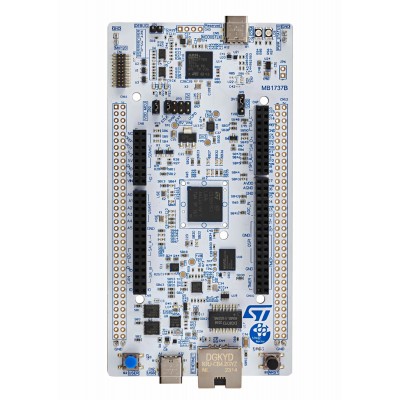ST NUCLEO-H7S3L8 Stm32 Geliştirme Kartı
STM32H7S3L8 600MHz Arm Cortex-M7 Cpu Fpu 64KB Bootflash 620KB Sram ST-LINK V2 Debugger Programmer Arduino Ethernet MIPI20 FD-CAN HyperRAM HyperFlash
The STM32 Nucleo-144 board provides an affordable and flexible way for users to try out new concepts and build prototypes by choosing from the various combinations of performance and power consumption features, provided by the STM32 microcontroller. For the compatible boards, the internal or external SMPS significantly reduces power consumption in Run mode.
The ST Zio connector, which extends the ARDUINO Uno V3 connectivity, and the ST morpho headers provide an easy means of expanding the functionality of the Nucleo open development platform with a wide choice of specialized shields.
The STM32 Nucleo-144 board does not require any separate probe as it integrates the ST-LINK debugger/programmer.
The STM32 Nucleo-144 board comes with the STM32 comprehensive free software libraries and examples available with the STM32Cube MCU Package.
Features:
- STM32 microcontroller in an LQFP144 or a TFBGA225 package
- 3 user LEDs
- 2 user and reset push-buttons
- 32.768 kHz crystal oscillator
- Board connectors:
- SWD
- ST Zio expansion connector including ARDUINO Uno V3
- ST morpho expansion connector
- Flexible power-supply options: ST-LINK USB VBUS, USB connector, or external sources
- Comprehensive free software libraries and examples available with the STM32Cube MCU Package
- Support of a wide choice of Integrated Development Environments (IDEs) including IAR Embedded Workbench®, MDK-ARM, and STM32CubeIDE
- Features specific to some of the boards
- Ethernet compliant with IEEE-802.3-2002: NUCLEO-H7S3L8
- USB Device only, USB OTG full speed, or SNK/UFP (full-speed or high-speed mode)
- Board connectors:
- MIPI20 compatible connector with trace signals (NUCLEO-H7S3L8)
- USB with Micro-AB or USB Type-C
- Ethernet RJ45
- On-board ST-LINK (STLINK/V2-1, STLINK-V3E, or STLINK-V3EC) debugger/programmer with USB re-enumeration capability: mass storage, Virtual COM port, and debug port
STM32H7S3L8:
- Core: 32-bit Arm Cortex-M7 CPU with MPU and DP-FPU, L1 cache: 32+32-Kbyte instruction and data cache allowing 0-wait state execution from embedded flash memory and external memories, frequency up to 600 MHz, 1284 DMIPS/2.14 DMIPS/MHz (Dhrystone 2.1), and DSP instructions
- Memories: 64 Kbytes of user flash memory that can be used for user code and/or external memory configuration.
- SRAM: total 620 Kbytes (548 Kbytes with optional ECC activated) organized as follows:
- 64+64 Kbytes minimum of instruction and data TCM RAM for critical real time instructions
- 384 Kbytes AXI SRAM (128 Kbytes with optional remap to TCM RAM fully activated
- 4 Kbytes of backup SRAM (available in the lowest-power modes)
- Flexible external memory controller with up to 32-bit data bus: SRAM, PSRAM, FRAM, SDR/LPSDR SDRAM, NOR/NAND memories
- Up to 2x octo-SPI memory interfaces or 1 octo-SPI + 1 hexa-SPI with XiP, with support for serial PSRAM/NAND/NOR, HyperRAM/ HyperFlash frame formats running at up to 200MHz
- 2x SD/SDIO/MMC interfaces
- 2x DMA controllers to offload the CPU
- 2 × dual-port DMAs with FIFO and linked listed support
- Security and cryptography
- PSA level 2 and SESIP level 3 certified (under certification)
- Flexible life cycle scheme with debug authentication based on certificate or password (debug reopening/regression support)
- Root of trust thanks to unique boot entry and secure hide protection area (HDP)
- Secure firmware installation / update (SFI/SFU) thanks to embedded root secure services (RSS)
- Secure data storage with hardware unique key (HUK)
- 2 AES coprocessors including one withDPA resistance
- Public key accelerator, DPA resistant with ECC verification feature only.
- On-the-fly encryption/decryption of serial and parallel external memories
- HASH hardware accelerator
- True random number generator, NIST SP800-90B compliant
- 96-bit unique ID
- 1 Kbyte OTP (one-time programmable)
- Active tampers
- Hardware secure storage (dedicated secure flash area)
- Graphics
- NeoChrom graphic processor (GPU2D) accelerating any angle rotation, scaling and perspective correct texture mapping
- Chrom-ART Accelerator (DMA2D) for enhanced graphic content creation
- Chrom-GRC (GFXMMU) allowing up to 20% of graphic resources optimization
- Hardware JPEG codec
- LCD-TFT controller supporting up to SVGA resolution
- Flexible memory controller FMC8/16 for parallel displays supporting up to WSVGA
- Digital camera parallel interface with pixel format conversion and cropping capabilities
- Clock, reset and supply management
- 1.71 V to 3.6 V application supply and I/O
- POR, PVD and BOR
- Dedicated USB power embedding a 3.3 V internal regulator to supply the internal PHYs
- Embedded regulator LDO to supply the VCORE and/or external circuitry
- High power-efficiency SMPS step-down converter regulator to directly supply VCORE and/or external circuitry
- Internal oscillators: 64 MHz HSI, 48 MHz HSI48, 4 MHz CSI, 32 kHz LSI
- External oscillators: 4-50 MHz HSE, 32.768 kHz LSE
- Low power: Sleep, Stop, and Standby modes
- VBAT supply for RTC, 32×32-bit backup registers
- Analog: 2x12-bit ADC, up to 5 MSPS in 12-bit, up to 17 channels
- Audio digital filters (ADF)
- 2 microphones /1 filter
- Voice activity detector (VAD) support
- Up to 152 I/O ports with interrupt capability
- Mathematical acceleration: CORDIC for trigonometric functions acceleration
- 23 timers: Sixteen 16-bit (including 5 x low power 16-bit timer available in stop mode, one graphic timer), four 32-bit timers, 2x watchdogs, 1x SysTick timer
- RTC with sub-second and hardware calendar with calibration (to be verified)
- Debug mode: Authenticated debug and flexible device lifecycle
- SWD and JTAG interfaces
- ETM with 2-Kbyte embedded trace buffer
- Up to 35 communication interfaces
- 3× I2C FM+ (SMBus/PMBus™)
- 1x I3C interface (muxed with one I2C)
- Up to 3 USARTs/4 UARTs (ISO7816 interface, LIN, IrDA, modem control) and 2x LPUART
- 6 SPIs with 4 with muxed duplex I2S and 3x USART configured in synchronous mode (9 SPIs)
- 2x SAI (serial audio interface)
- 2× FD-CAN
- 16-bit parallel slave synchronous interface
- SPDIF-IN interface, HDMI-CEC
- Ethernet MAC interface with DMA controller
- 1 USB Type-C®/USB power delivery controller
- 1 USB OTG full-speed with embedded PHY
- 1 USB OTG high-speed with embedded PHY

Paket içeriği:
- 1 Adet NUCLEO-H7S3L8 Kit
Dikkat = Paket içerisinden usb kablo çıkmaz.














































































